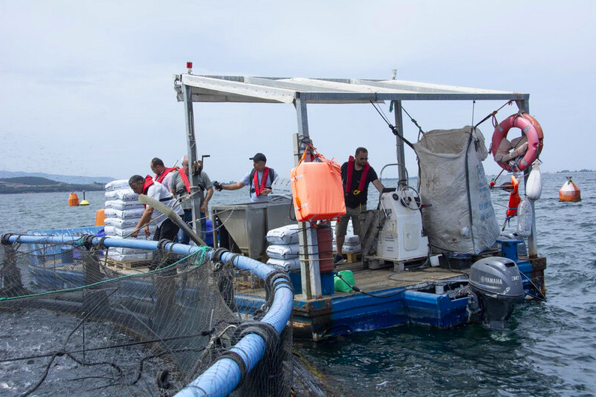Stimulating Sustainable Growth of Small-Scale Aquaculture in the Southeastern Mediterranean Through an Innovative Capacity Development Program

By Mohammed Drihem
The General Fisheries Commission for the Mediterranean (GFCM) of the United Nations Food and Agriculture Organization (FAO) and “New Agriculture New Generation,” a Greece-based non-governmental organization, have organized an innovative capacity development training program with the participation of five small-scale aquaculture producers from the southeastern Mediterranean.
According to its initiators, this innovative program combines classroom theoretical training with practical field visits and tailored coaching sessions. It aims to support the sustainable growth of small-scale aquaculture in the southeastern Mediterranean by providing small farm owners with business, marketing, and entrepreneurial information. Participants were selected based on specific sustainability criteria as part of an open call launched in Algeria, Egypt, Lebanon, Morocco, and Tunisia.
According to Houssam Hamza, aquaculture manager at the GFCM, “Small-scale aquaculture is an integral part of the Mediterranean heritage and contributes significantly to the Mediterranean diet. It is crucial to support and modernize farming tools to ensure the well-being of farmers, aquatic species, and the environment.”
It is worth noting that last June, participants attended the first phase of the program, which began at an event in Athens, where Maria Damanaki, former European Commissioner for Maritime Affairs and Fisheries, emphasized the importance of aquaculture for future food security while commending initiatives that develop the capacities and skills of farmers in the region. Representatives of key industry players, including the Hellenic Aquaculture Producers Association, the Agricultural University of Athens, and industry bodies in Greece, as well as representatives from the embassies of Algeria, Egypt, Lebanon, Morocco, and Tunisia, were also present.
According to the organizers, participants attended a series of training workshops in Greece on strategy, innovation, sustainability, technological trends, marketing, and sales during this phase of the program. They discovered various techniques and practices from the region, exchanged ideas and plans, and visited modern research units and laboratories for aquaculture and aquaponics to better understand Greek expertise in the sector.
For Lebanese participant Massaad Ejbeh, “Participating in this program was a transformative experience, as it provided many insights into growth and development, and visiting marine fish farms revealed the significant potential of red seabream farming, opening up new prospects for expanding our product range. Upon returning home, I plan to develop a recirculation aquaculture system for red seabream, which will be a significant step in enhancing our production in an efficient and sustainable way.”
Algerian participant Abderrazak Kiram stated, “After the intensive training on strategic management and sustainable aquaculture product marketing, we learned practices and techniques that will help us improve our project at home. We visited several farms, and this will be extremely useful as we are currently planning to expand our spirulina and algae farming and explore how to cover the local market and penetrate global markets.”
Moroccan participant Housni Chadli remarked, “The greatest benefit of this training is the contact with the organizing team and the other participants. I am sure that the work we started here will continue for a long time, creating profitable synergies for all of us.”
This program underscores the importance of sustainable small-scale aquaculture in the Mediterranean by focusing on its contribution to the GFCM 2030 Strategy for Sustainable Fisheries and Aquaculture in the Mediterranean and Black Sea, as well as the FAO Blue Transformation Vision and the United Nations Sustainable Development Goals. In particular, the program highlights how small-scale aquaculture can help provide nutritious, protein-rich food, diversify livelihoods, generate jobs and income, and empower women in the region. In the future, program participants will receive tailored coaching in their countries on the best ways to sustainably develop their businesses.
Source: Oujda City

